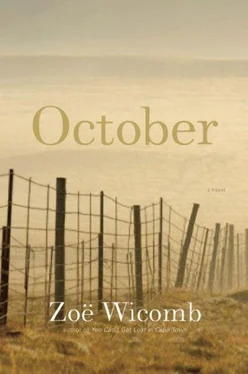Craig, who had been rushing along the path in search of familiar landmarks, came to a sudden halt. There, he whispered, taking her hand, look. Salmon seemed to float effortlessly upstream, then, bracing themselves, gathered speed in order to scale the rapids. As they rose in the light their scales glinted the mineral silver of the sea, the trophy of travel, of having managed the crossing from river to ocean, but alas, the return was not going to be easy. The healthier fish hurled themselves defiantly at the broiling water but their arched, curved bodies would fall back, thwarted — then, only the briefest rest before tackling the rapids once more. Heroic, yes, but Mercia felt embarrassing tears prickle as the indomitable creatures were repeatedly beaten, some cut by the rock as they fell back, leaving trails of blood. In the quiet pools the less vigorous salmon flopped about, exhausted, before taking up once more the quest of that circular journey now so near its end.
Craig explained about the redds upstream where months ago the fish were spawned and to which they now tried to return to make new redds and do some spawning of their own. Clever, yes, but how repellent, Mercia thought, the endless repetition, not only the biological imperative to reproduce, but the need to return to origins, to the very same stream, to make their babies back home. After all that travel and the dodging of dangers — far more radical than any Homeric adventure, as their very organs adapted to the crossing from fresh water to the salt of the sea — this was surely disappointing: the circularity of their lives, and the return all tainted with October blood. Really, she should not have been applauding the few, should not have been rooting for the salmon to perform the spectacular leap, the momentary disappearance in the white spume, before surfacing in a triumphant arc above the rapids, in the calm of the stream where free of the fury they could head upstream. Not yet triumphant, since there would be more rapids to negotiate, more endurance tests before reaching the old spawning grounds, but hopefully none as trying as these at Gartness. Did they remember the reverse journey, the carefree, dizzying tumble downstream through the rapids?
What happens, she asked, when they get home, to the fond ancestral streams?
Well, it’s not only the end of the odyssey, it’s the end of their lives. After the female digs her redds in the gravel of quiet waters and the male does the fertilizing, they’re just about pooped, ready to die and make way for the next generation.
Oh, midst the splendor of water and words like autumnal, she could kill herself after all. Mercia could no longer bear to look. Call it a tourist attraction! It was indecent; the place should be fenced off; humans should be sheltered from Mother Nature’s cruel displays. How awful that return. She for one did not want to see it — the gravel redds murky with spawn and the self-satisfied rumbling of parents, turned into shallow graves where, exhausted by the business of reproduction, the salmon must lie down and die.
Well, they don’t exactly die in the redds. There the new organisms will be growing into little smolts, the small fry, Craig explained.
She shuddered. Had he noticed, Mercia asked, young mothers steering prams in shopping malls or airports, explaining this or that to their little Johnnies in super-loud voices that declared the world a redd, a special place of spawning, of triumphant arrival. Craig laughed. That was not why he had brought her to Endrick, but he agreed. An object lesson in reproduction, base, primitive, animal, and he lifted her off the ground, spun round triumphantly in the slippery mud and declared that they were not ready to die.
Imagine, she said, making a song and dance about the wise salmon, when the wisdom is driven by reproduction, by the fetishizing of origins. No wonder salmon have pride of place in Glasgow’s coat of arms.
Please, he said, no aspersions on Finn MacCool. That’s my Irish heritage you’re scoffing at. You should eat the salmon skin — best pan-fried and crisped — so that like my good self and Finn MacCool you too can gain knowledge of the world, become the oracle. Mercia would have to lighten up; she could see for herself that it was nonsense talk, this being in tune with nature — this wanting to kill herself, Craig said.
So off they went in the bright October light, back to the city for an invigorating bottle of red wine and protected sex.
It was presumably Craig’s Irish heritage and all that crisped salmon skin that made him succumb. Mercia had been called by his sister, Fiona, who asked to meet for a coffee. She should have known; she and Fiona were not really friends. They sat at Gandolfi’s, where Fiona chattered frantically as if warding off an attack of some kind. She ordered too many cakes, which they pushed around on their plates. When finally it was acceptable to leave, as Mercia pushed back the heavy, carved chair, Fiona placed a restraining hand on hers.
Morag is pregnant, she said, and she would rather Mercia heard it from her, and sooner rather than later.
Mercia took a deep breath. When? she asked, ready to calculate the date of conception.
Fiona explained that it was a surprise to them, that the baby was not due until late November.
Mercia said a terse thank-you, and made herself walk out slowly. No running, and hold your head high, no not Johnny-head-in-the-air like her father had taught her; rather, as the Pilates teacher said, with a soft peach under the chin. That is what Mercia mouthed, over and over, as she walked tall through the Merchant City, through Queen Street station, to the Underground: soft peach under the chin. The trick was not to squash it.
So long it was, after Craig had left. Who would have thought that she’d have any tears left, but it felt as if the wound was being prised open. What exactly was Mercia crying for? If Craig had not taken the younger woman to Gartness, hadn’t shown her the leaping salmon, what was it to her?
Such reasoning did not stop the pain.

Shards of autumnal light, the city leaved with October blood, yes, she remembers the day of the leaping salmon so clearly. When she gets back to Scotland, Mercia vows, she will return to Endrick Water. Many years have passed, and no doubt the path on the riverbank would be paved, and there would be signs prompting the tourist to press a camera button for the picturesque shot, alert her to the best place from which to view through a lens the crazed salmon glinting metallic above the water. She wants to be shot of Craig and his salmon, and since memory is so bound up with place, she believes that all such places must be revisited, the previous memory erased. That trip had left her with distaste for the iridescence of fish scales, for all things circular, for journeys that must end where they started.
Mercia is not home because this is where she started out; she is here in Kliprand, she reminds herself, because Jake wanted her to come. Now a wasted Jake seems to have lost his marbles, keeping out of reach, silent in a room dark and musty with the fumes of alcohol. She knows that she too is in a sense hiding from him, that she too wants to put off talking, put off the unknown decisions that talking will bring. In the meantime, the moderate October heat is comforting, and she does love the familiar view of gray-green scrub with flat-topped mountains looming blue in the distance. She loves that hot, red sand where ancient tortoises sit for days resting in the same scrap of shade as if the earth had not moved, or night had not fallen, tortoises whose purpose it would seem is to endure the passage of time.
So despite Jake, and Sylvie’s horrible chatter, Mercia knows that this is home. There is a part of her, perhaps no more than insensate buttocks, that sinks into the comfortable familiarity of an old sofa. Which is nothing to do with three-legged cast-iron pots or roosterbrood; besides, the light slants onto the floor precisely as it does at the other end of the year in Glasgow — the world simply reversed. But here, is it not conceivable that Mercia could stretch out, boots and all, for a while at least, open her heart, let in the heat and light, and check to see how much of it has mended?
Читать дальше













